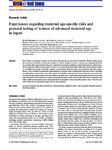Experiences regarding maternal age‐specific risks and prenatal testing of women of advanced maternal age in <scp>J</scp>apan
| dc.contributor.author | Murakami, K | |
| dc.contributor.author | Turale, S | |
| dc.contributor.author | Skirton, Heather | |
| dc.contributor.author | Doris, F | |
| dc.contributor.author | Tsujino, K | |
| dc.contributor.author | Ito, M | |
| dc.contributor.author | Kutsunugi, S | |
| dc.date.accessioned | 2015-12-16T17:11:26Z | |
| dc.date.available | 2015-12-16T17:11:26Z | |
| dc.date.issued | 2016-03 | |
| dc.identifier.issn | 1441-0745 | |
| dc.identifier.issn | 1442-2018 | |
| dc.identifier.uri | http://hdl.handle.net/10026.1/3957 | |
| dc.description.abstract |
<jats:title>Abstract</jats:title><jats:p>The number of pregnant women of advanced maternal age has increased worldwide. Women in this group have an increased chance of fetal abnormality. To explore <jats:styled-content style="fixed-case">J</jats:styled-content>apanese women's experiences regarding maternal age‐specific risks and prenatal testing, we conducted a descriptive qualitative study. Semi‐structured interviews were conducted with 16 women aged 35 years or over who had given birth within the previous three months to a healthy, term infant. Thematic analysis of transcribed interview data was performed and three major themes were identified: inadequate understanding of genetic risks; insufficiently informed choice regarding prenatal testing; and need for more information from health professionals. Some participants were not aware of maternal age‐specific risks to the fetus. Many took their cues from health professionals and did not raise the topic themselves, but would have considered prenatal testing if made aware of the risks. Nurses, midwives and other health professionals need to adequately inform pregnant women about the genetic risks to the fetus and offer testing at an appropriate stage early in the pregnancy.</jats:p> | |
| dc.format.extent | 8-14 | |
| dc.format.medium | Print-Electronic | |
| dc.language | en | |
| dc.language.iso | eng | |
| dc.publisher | Wiley | |
| dc.subject | advanced maternal age | |
| dc.subject | informed choice | |
| dc.subject | prenatal testing | |
| dc.subject | qualitative study | |
| dc.subject | risk perception | |
| dc.subject | thematic analysis | |
| dc.subject | fetal abnormality | |
| dc.title | Experiences regarding maternal age‐specific risks and prenatal testing of women of advanced maternal age in <scp>J</scp>apan | |
| dc.type | journal-article | |
| dc.type | Journal Article | |
| dc.type | Research Support, Non-U.S. Gov't | |
| plymouth.author-url | https://www.webofscience.com/api/gateway?GWVersion=2&SrcApp=PARTNER_APP&SrcAuth=LinksAMR&KeyUT=WOS:000371735400003&DestLinkType=FullRecord&DestApp=ALL_WOS&UsrCustomerID=11bb513d99f797142bcfeffcc58ea008 | |
| plymouth.issue | 1 | |
| plymouth.volume | 18 | |
| plymouth.publication-status | Published | |
| plymouth.journal | Nursing & Health Sciences | |
| dc.identifier.doi | 10.1111/nhs.12209 | |
| plymouth.organisational-group | /Plymouth | |
| plymouth.organisational-group | /Plymouth/Faculty of Health | |
| dc.publisher.place | Australia | |
| dcterms.dateAccepted | 2015-01-18 | |
| dc.identifier.eissn | 1442-2018 | |
| dc.rights.embargoperiod | Not known | |
| rioxxterms.versionofrecord | 10.1111/nhs.12209 | |
| rioxxterms.licenseref.uri | http://www.rioxx.net/licenses/all-rights-reserved | |
| rioxxterms.licenseref.startdate | 2016-03 | |
| rioxxterms.type | Journal Article/Review |


